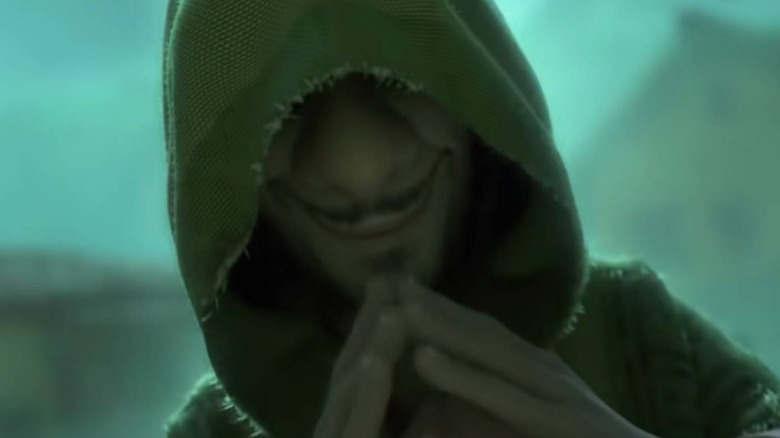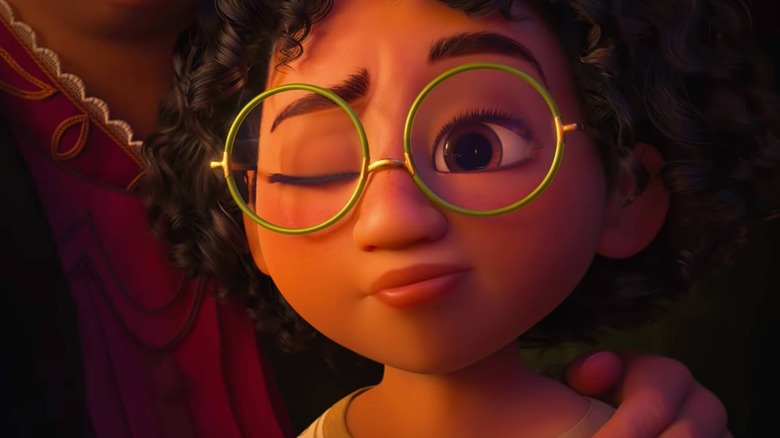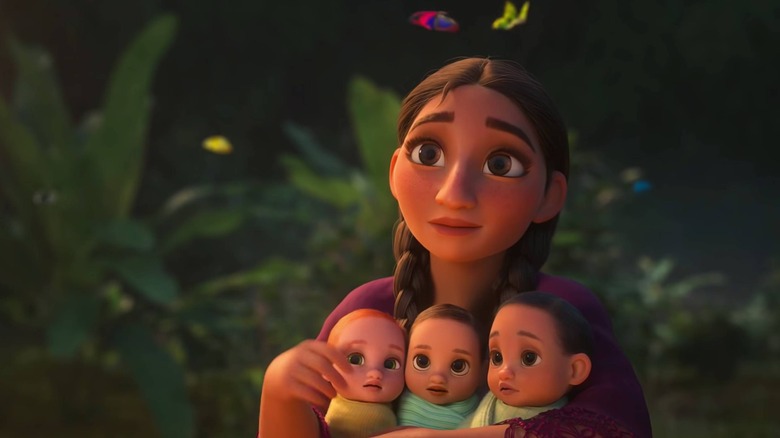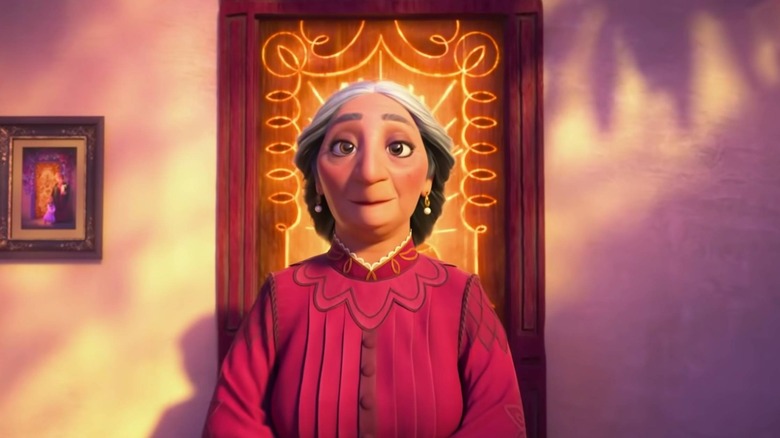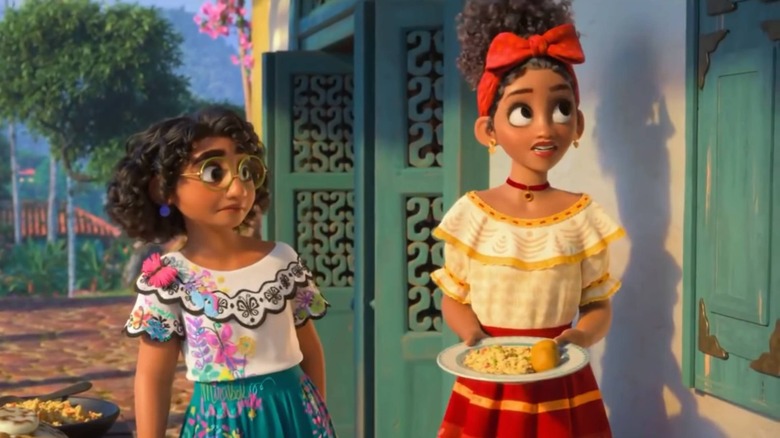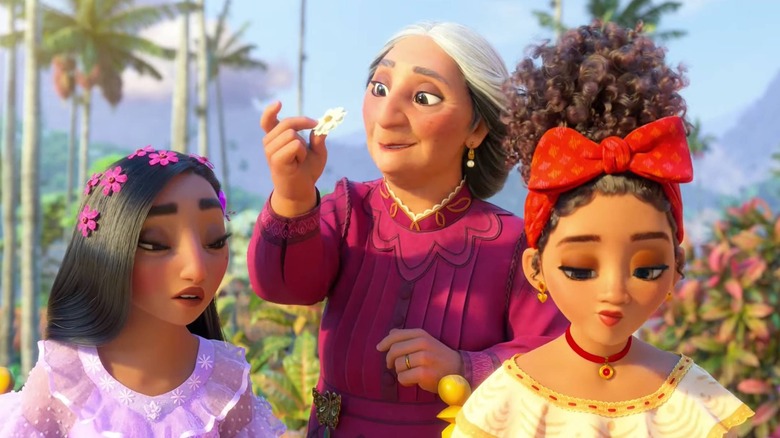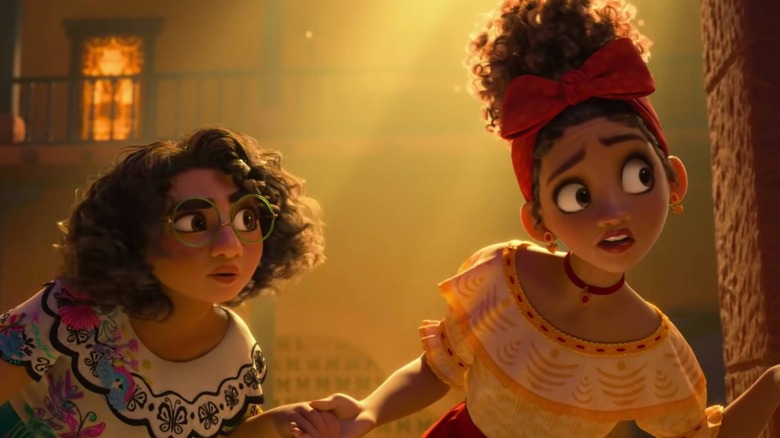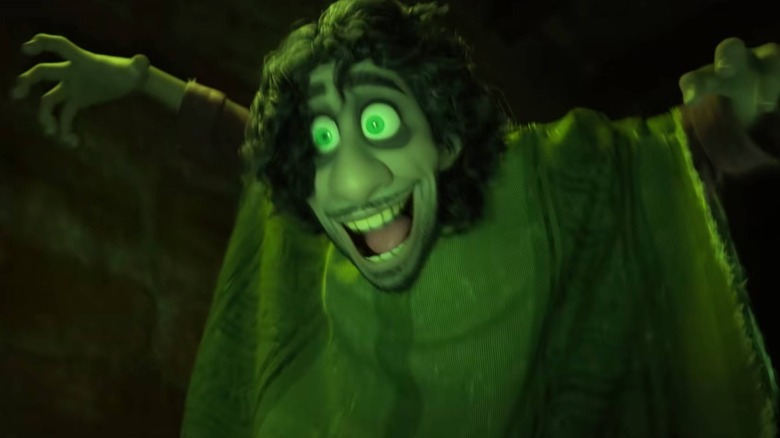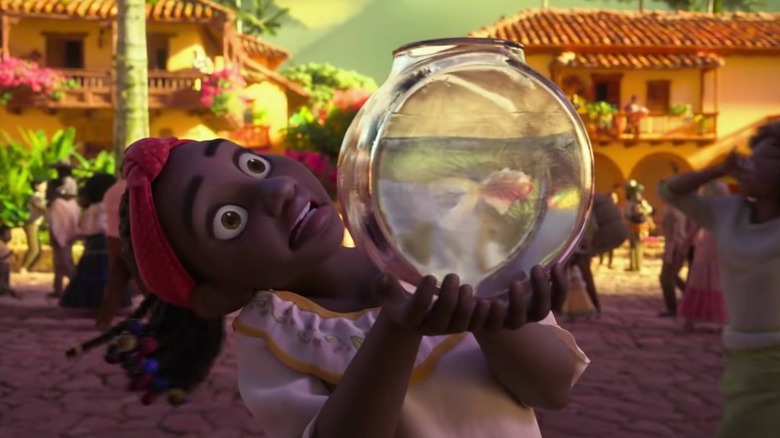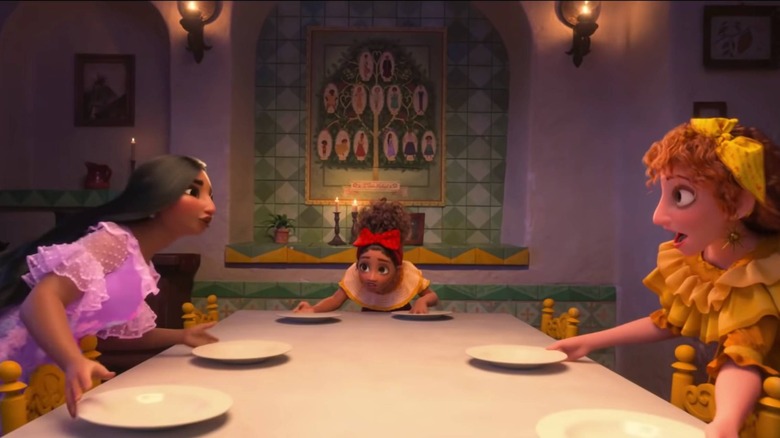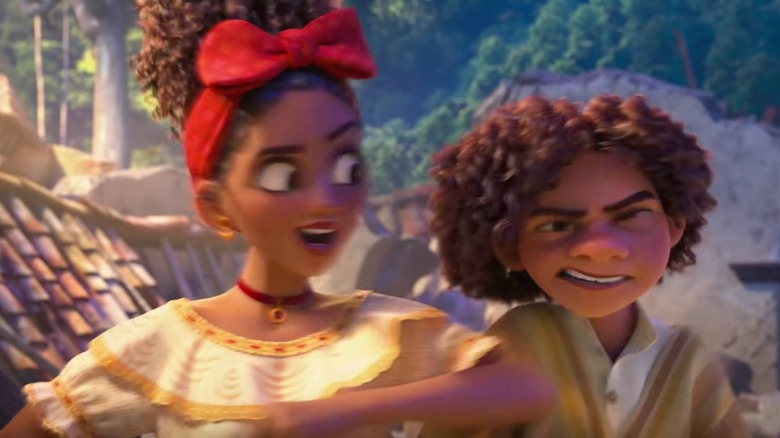Lines In Encanto That Are More Important Than You Think
"Encanto" is more than just another animated Disney movie. It might be one of the best movies of 2021, with a message from which families of all stripes can learn.
Audiences were moved to tears by the story of the Madrigal family, who were, at one point, torn apart from the encanto only to find their way yet again. They shunned Bruno (John Leguizamo) to the point where he felt more comfortable living within the walls than thinking he inadvertently was hurting his family. The Madrigals were also doing the same thing to Mirabel (Stephanie Beatriz), excluding her from the family photo just because she wasn't given powers. It's a film that deftly showcases the damage families can do to one another and how it's important to accept everyone, regardless of how special (or not) they are.
Ever since the film landed on Disney+, fans have been able to watch and rewatch at their leisure, perhaps catching new things each time. Whether you're checking it out for the first or twentieth time, there are lines scattered throughout you may not have noticed at first, but upon closer inspection they possess deeper meaning, foreshadowing, or are simply interesting to ponder more deeply.
"Open your eyes"
The very first words spoken in "Encanto" are "Open your eyes." Abuela (María Cecilia Botero) tells this to a young Mirabel as she explains the secret of the encanto. It seems innocuous at first, but eyes actually play a pivotal role throughout the movie. In the song "Waiting on a Miracle," Mirabel repeatedly sings "open your eyes," and it comes across as a callback to the line her grandmother told her all those years ago.
When Mirabel eavesdrops on Abuela, she hears her say, "Open my eyes. If the answer is here, help me find it." Also, the way Dolores (Adassa) knows that Luisa (Jessica Darrow) is stressed is due to her eye twitching. But here's where things get really interesting. If you take the first two syllables of Mirabel's name ("Mira"), you have the Spanish word for "sight." It's an appropriate name for Mirabel, seeing how she's ultimately the one who has to open Abuela's eyes to the fact she was hurting her family by putting so much pressure on them.
In these instances, vision is more important than merely seeing things in front of you. It's about really analyzing one's actions and taking into consideration whether there are steps that can be taken to improve how they treat others.
"Make your family proud"
Later in the opening scene, it becomes clear that Abuela is preparing Mirabel for her ceremony, where she'll receive her gift. Of course, the audience learns that Mirabel didn't receive a gift at all, but for the moment, Abuela is hopeful that Mirabel will carry on the tradition for the Madrigal family. She exemplifies this by saying, "Tonight, this candle will give you your gift, mi vida. Strengthen our community, strengthen our home. Make your family proud."
It may not seem like much on first watch, but that's an awful lot of pressure to put on a five-year-old. All of the kids were only five when they received their gifts, and right from the start, Abuela applies far too much pressure, telling them to strengthen their community and home while also making their family proud. The idea that they need to bring pride to their family from such a young age exhibits how it's understandable that so many of the Madrigals deal with anxiety later in life.
It's especially heartbreaking to consider how Mirabel must have felt when she didn't receive her gift. She was told to make her family proud with her gift, and now that she has no gift, how can she possibly make her family proud? That mindset surely instilled a sense of always needing to be better than average in order to prove they are worthy of love.
"Let's be clear, Abuela runs this show"
Mirabel may not have any powers of her own, but she functions as a sort of cheerleader for the rest of her family, which viewers see in the opening musical number, "The Family Madrigal." In it, Mirabel sings about all the fabulous powers her aunts, uncles, cousins, and siblings have been blessed with, and even though she also doesn't have any powers, Mirabel still shows her abuela some love by singing, "Let's be clear, Abuela runs this show."
On the surface, this line seems to indicate that Abuela is the family matriarch. She's the one who first stumbled upon the encanto and allowed casita to form. She led her family to this magical house and allowed the neighboring village to prosper. However, upon closer inspection, the line inadvertently gives away how few people in the family Madrigal are actually happy.
Abuela running the show means she's the one who dictates what everyone has to do. Not only does she dispense with chores, but it's clear later in the movie that she's also in charge of their personal lives, too. She oversees the union between Isabela (Diane Guerrero) and Mariano (Maluma), even though we learn Isabela doesn't want to marry him at all. The Madrigals have all sacrificed their own personal happiness in the pursuit of making Abuela happy, because she's the one in charge around here.
"The only one worried about the magic is you ... and the rats talking in the walls"
Initially, Mirabel's the only one who cares about the house cracking and the magic being in danger. To get to the bottom of the situation, she turns to her cousin Dolores, who can hear a pin drop a mile away. However, Dolores also doesn't take what's happening seriously, saying, "The only one worried about the magic is you ... and the rats talking in the walls."
At first, it comes across as a quirky thing to say, but it also functions as foreshadowing for Bruno living with casita's walls. After all, casita is all-powerful, so why would it allow rats to take refuge in its walls unless there was some sort of higher purpose at play, such as a Madrigal staying with the rats?
However, the line also raises a few questions, namely, "Can Dolores understand rats?" The gift Antonio (Ravi Cabot-Conyers) receives is the ability to communicate with animals, so it makes sense he can later understand the rats. But how would Dolores know the rats are worried about the walls unless she can understand them, too? Does she have a secondary ability? Did she merely hear the rats squeaking more often and took it to mean they were concerned? Such questions, perhaps, are better left unanswered.
"He wants five babies"
When the Madrigals sit down for breakfast, the topic of discussion involves the impending union between Isabela and Mariano. Dolores listens for Mariano's household to get all of the pertinent information, and through this she learns that Mariano wants five babies.
Isabela reacts negatively to this news, popping out a bunch of flowers in her hair, including one that doesn't go with the rest. While it seems like the line is played for a bit, it also functions as foreshadowing. For starters, Isabela's reaction serves as an early hint that she really doesn't want to get married to this guy. They clearly have different wants and needs out of life, and although Isabela may want children, she clearly doesn't want five.
Additionally, it hints at Dolores' true feelings for Mariano. In "We Don't Talk About Bruno," Dolores makes it known that she actually carries a flame for Mariano but could never be with him. The fact she reacts so calmly to the news he wants five babies means she understands where he's coming from, and she'd probably like to be the one to give him those five children.
"Magical blessings"
The other person who's delighted at the news of having five more youngsters around is Abuela. She responds to that information by saying, "Wonderful, such a fine young man with our perfect Isabela will bring a new generation of magical blessings and make both of our families stronger."
The use of the term "magical blessings" is interesting here. She's not happy that the family will grow and that there will be new people to love and care for. She's glad there are new family members who can also receive magical gifts and help out the town. She views future Madrigals as tools, rather than people to further her own status.
This fact wasn't lost on viewers, as Redditor u/Ishdakitty wrote on a thread, "It's clear that she sees more children as potential gifts they contribute to the family, rather than new family members. She's lost sight of the family as individual people. She even admits this at the end." Abuela should've seen her future great-grandchildren as blessings regardless of what they contributed to the family. But she couldn't separate the magic from what it means to be a Madrigal.
"Was Hercules ever like, 'Yo, I don't wanna fight Cerberus?'"
"We Don't Talk About Bruno" may get all the radio play, and "Dos Oruguitas" may have received the Oscar nomination, but there's something to be said about the relatability of "Surface Pressure." Luisa's anthem sees her bemoaning a position in life where she feels like she always has to prove her strength; otherwise, she'll feel worthless as a person. She uses plenty of great analogies throughout the song, but the most intriguing lyric is arguably, "Was Hercules ever like, 'Yo, I don't wanna fight Cerberus?'"
It's an interesting line, because Hercules actually didn't want to fight Cerberus. He was forced to do so due to the labors set forth by Hera, who wanted to make Hercules suffer as much as possible. Hercules didn't fight Cerberus, which was the final labor, because he thought it would be fun. He merely wanted to get Hera off his back so that he could go live his life.
Hercules may be seen as the pinnacle of strength, but it doesn't take any stretch of the imagination to see how he'd be miserable despite his muscles, just like Luisa. He simply wants to live in peace, but has a matriarchal figure forcing him to perform immeasurable feats. The two are more similar than one might think.
"I associate him with the sound of falling sand"
It's easy to see why the world took such a liking to the "Encanto" hit "We Don't Talk About Bruno." It's catchy and infinitely singable, rich with layers. That includes the following line sung by Dolores, "I associate him with the sound of falling sand."
The "him" here is Bruno, and at first, the audience may surmise that the falling sand has to do with his tower. We were just in there with Mirabel, and it was awfully sandy. However, the sand she's hearing may come from a different source.
When we meet Bruno later, he's a pretty superstitious guy. One of the things he does to prevent bad things from happening involves throwing salt over his shoulder. It's possible that the "sand" Dolores has heard all of this time was actually salt she associated with sand. Plus, by the end of the film, we know Dolores could hear Bruno the entire time, but more on that later. Another theory is that the line refers to an hourglass — and the burden of time that surrounds him via his future-telling gift.
"Seven foot frame, rats along his back"
After Dolores' verse of "We Don't Talk About Bruno," we get Camilo's, who takes a decidedly different approach to telling his cousin about their uncle. Whereas it almost seems like Dolores was trying to offer Mirabel hints that Bruno was in the walls the whole time, Camilo merely wants to scare her, and he accomplishes this with his first line of, "Seven foot frame, rats along his back."
It's a grotesque image, and one that doesn't make that much sense. When we finally meet Bruno, he's certainly not seven feet tall. He's actually pretty short, all things considered. And while he does have rats running along his back, they're perfectly friendly. So, where exactly did Camilo get the idea that his uncle was tantamount to a monster under the bed?
It makes sense when you consider the last time Camilo likely saw his uncle. We know he's been gone for roughly 10 years, but he occasionally sneaks out of the walls to grab food from the kitchen. There's a good likelihood that at one point, Camilo saw Bruno grabbing some food in the kitchen when he was a young boy, so Bruno would've appeared much larger than his actual size. It could've given Camilo nightmares he still thinks about to this day, which is why his verse is so scary. It's just a theory, but it all seems to add up.
"He told me my fish would die, the next day: dead"
It's not just the Madrigals who have a problem with Bruno. All of the villagers seem to have fallen victim to his prophecies. One sings about how her goldfish died, while another talks about how he grew a gut. A priest even blames his baldness on Bruno.
The only problem with all of that is that none of those things are actually Bruno's fault. They all would've happened, whether Bruno told them their futures or not. Goldfish don't live very long, and things like growing a gut and going bald are often the fault of genetics. In fact, the only thing in the entire song that Bruno could be seen as partially responsible for is perhaps ruining Pepa's (Carolina Gaitán) wedding, because telling her bad weather was coming caused her to freak out and create the hurricane herself (via her powers).
This particular verse underlines how Bruno's power wasn't bad on its own. He simply told people things would happen they didn't necessarily want to hear, and instead of going along with it, they made Bruno out to be a villain. Perhaps worst of all, the Madrigals all-too-willingly accepted the label the villagers thrust upon one of their own.
"It's like I hear him now"
Right before everyone sings their verses in "We Don't Talk About Bruno," you can briefly hear Dolores sing, "It's like I hear him now."
In the moment, it appears as though she's referring to hearing Mariano, especially seeing how he's on his way to casita for his dinner with the Madrigals. However, it's important to remember who the main subject of the song truly is: Bruno. And with her super hearing, it makes sense that she would also be able to hear Bruno through the walls.
This isn't the only reference in the song that alludes to the fact Bruno hides within the walls. During Dolores' other verse, you can find a silhouette of Bruno creeping along the second story of casita. Appropriately enough, this shadow appears along the wall of the house, which is precisely where Bruno has resided for the past 10 years.
"Yo I knew he never left, I heard him every day"
Not only do the Madrigals repair their house by the end of the film, but they also come together as a family. They've gone through overwhelming odds, but it seems like the cycle of generational trauma is over. They've realized how much they need Mirabel, and they've accepted Bruno back into the family. The Madrigals are whole once again, including the three triplets Abuela gave birth to, which makes it kind of odd when Dolores sings, "Yo I knew he never left, I heard him every day."
The line opens up a whole host of questions, such as how come Dolores couldn't keep Mirabel's secret for more than a few minutes, but she could keep quiet about her uncle living in the walls for 10 years? Perhaps she thought it wasn't her place to let people know about Bruno's secret. Or maybe she, too, was scared of what Bruno was capable of and figured it was easier to live this way.
Ultimately, it makes sense Dolores would know if someone was scurrying through the walls. While it may raise a lot of questions, it doesn't break the reality of the film. It's clearly just meant as a fun joke, even if Dolores surely must've heard how sad he was for all those years.
